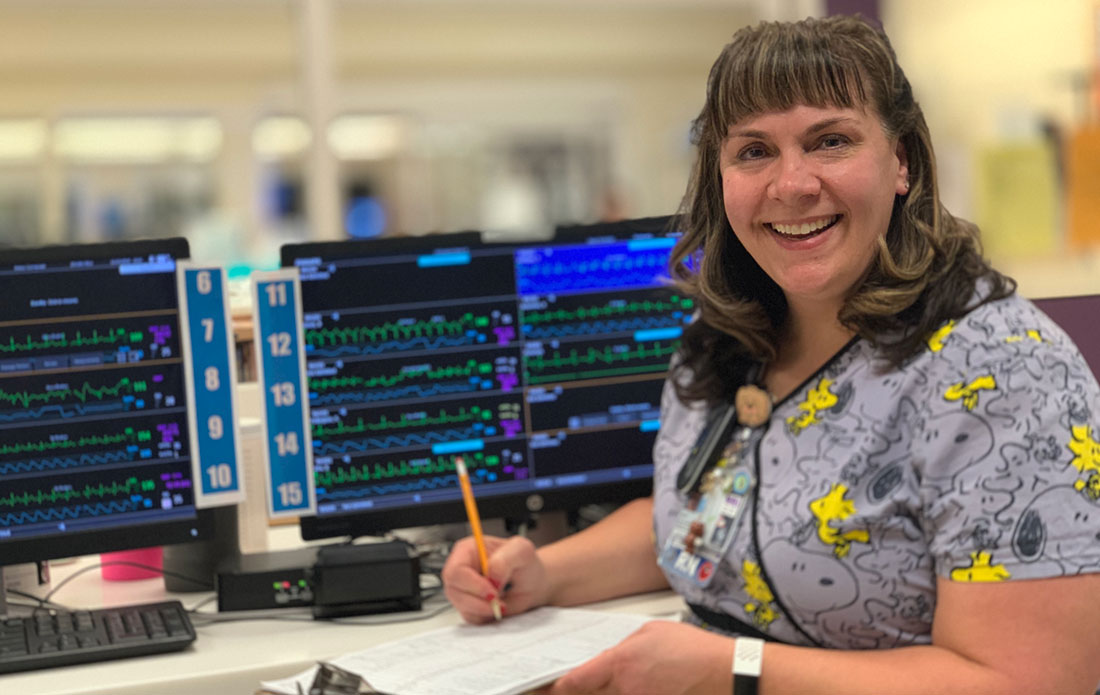When children undergo intense medical treatment at Doernbecher, families often say that their care team at Doernbecher—particularly the nurses—made all the difference in their experience. Nurses build incredible bonds with kids and their caregivers during a time when they need support more than ever. When kids are feeling fragile, overwhelmed and scared, nurses are there.
Leo Eskola, RN, is a nurse in the Pediatric Intensive Care Unit and has worked at Doernbecher for 19 years. In this guest post, she shares her thoughts on her job and nurses’ impact on families, in her own words:
“When I think of nursing and what it means to be a nurse at Doernbecher, I think of someone who is a master of two domains. As a nurse we have to understand the complex medical issues going on and to be able to carry out the necessary interventions, treatments and medications needed to make the child better.
The doctors often decide what needs to be done, when and how often. The nurse must understand all that and then know how to implement it and get it done in the most efficient, knowledgeable, compassionate way possible. The nurse is the eyes and ears of the doctor at the bedside. We are continually assessing and evaluating what is happening with the patient and then relaying that back to the doctors so we can continue to adapt our treatment plan as the patient needs.
But we are also in the unique position to be at the bedside with the patient and families for long periods of time. We act as translators for the families, putting the medical information into terms they can understand. We are educators, teaching families how to care for their child. We act as a voice for patients and families, helping them express their concerns to the medical team.
We facilitate bonding and interaction in the midst of what seems like chaos.
When a child is sick, especially sick enough to be admitted to the PICU, they lose their identity in a way. The medical team has to focus on the most immediate needs to stabilize that child.
Parents’ most precious gift is in the hands of strangers. They experience a loss of control and overwhelming fear. Nurses are the comforters and encouragers—often listening to stories, looking at photos and sharing memories of their child.
Being at the bedside and interacting with the patient and families allows us the time to find out what makes each child unique and special, what brings meaning to them and their families—and that makes the child much more than a diagnosis. Each is a full-rounded person.
We know their favorite blanket or stuffed animal. We know their favorite character on Paw Patrol. We know if they like vanilla or chocolate ice cream. We know they hate brushing their teeth or doing their respiratory treatments or walking around the unit—but they will do it if you let them pick out a princess sticker for their sticker chart.
Nurses carry out the complex and high quality medical care while providing any comfort or kindness we can to reduce fear and pain. And nurses do this based on the developmental needs of each patient. Nurses must know and understand kids from birth to 18 years old with various developmental abilities.
They also have to know how to calm and support both the patient and families while they are under extreme stress. Nurses are not only assessing and treating the physical condition, they are doing the same for the mental and emotional condition of the child and family.
“We know their favorite blanket or stuffed animal. We know their favorite character on Paw Patrol. We know if they like vanilla or chocolate ice cream.”
Leo Eskola, RN, OHSU Doernbecher Children’s Hospital
We help families retain hope. Parents often grieve the loss of hopes and dreams, especially if a child is born with congenital defects or disabilities or is injured somehow and now will have some delays. But the nurses teach families how to modify the goals and dreams and that milestones can still be met but might take longer. Nurses empower parents by educating them on how to care for their child and give them back independence and control.
At Doernbecher, we see life change in the blink of an eye. Nurses have the privilege to work with some of the most brilliant minds in medicine, cutting-edge technology and the most current treatments and medications. They combine that with family-centered care, and the result is amazing.
We see parents hold their baby or put clothes on their baby for the first time; we see tears of joy when their child utters their first word after the breathing tube is removed; we see relief when their child squeezes their hand, smiles and asks for French fries after a 16-hour brain surgery to remove a tumor. We see peace and comfort when a child dies, but their dignity, culture and spiritual beliefs were maintained.
It is an extraordinary feeling to be a part of the tangible joy and emotion that radiates off parents when they see these successes. It is an honor to be a part of it and to be a part of a team that focuses on the highest quality of care in the most kid-friendly, compassionate way possible.
At the end of the day, I feel good that the children and families of the Pacific Northwest have a place to go to receive exceptional medical care. I never wonder if they would get better care from a different children’s hospital in a bigger city because I know we are practicing at the highest level, just better, and that is why Doernbecher is ranked as one of the best children’s hospitals in the United States.”
Leo shared this with the audience at the Doernbecher Freestyle unveiling and auction in November, 2019.

